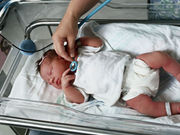Researcher hopes to see routine respiratory syncytial virus immunization within a decade
THURSDAY, Nov. 5, 2015 (HealthDay News) — Another research team is reporting progress toward developing a vaccine to prevent respiratory syncytial virus (RSV). Their findings were published in the Nov. 4 issue of Science Translational Medicine.
In the phase 1 study, scientists tested an experimental nose-drop vaccine in 15 adults, 15 children who’d been infected by the virus, and 30 infants and children who had not. Some of the children received a placebo. The vaccine was developed by the U.S. National Institutes of Health’s Laboratory of Infectious Diseases. It’s a genetically engineered form of the virus that’s designed to prime the immune system but not so much that it causes illness.
The researchers found that the weakened virus “still elicited a very strong immune response in infants and young children. We saw this strong immune response after only a single dose of vaccine,” study author Ruth Karron, M.D., director of the Center for Immunization Research at the Johns Hopkins University Bloomberg School of Public Health in Baltimore, told HealthDay. “Though this is quite a small study,” she added, “these findings are exciting and change the way in which we think about developing live RSV vaccines for children.”
Karron said similar vaccines are now being tested in clinical trials or will be tested soon. “We hope that a live vaccine for RSV will be available sometime within the next decade,” she added.
Full Text (subscription or payment may be required)
Editorial (subscription or payment may be required)
Copyright © 2015 HealthDay. All rights reserved.








